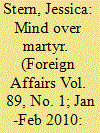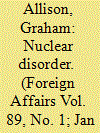|
|
|
Sort Order |
|
|
|
Items / Page
|
|
|
|
|
|
|
| Srl | Item |
| 1 |
ID:
094479


|
|
|
|
|
| Publication |
2010.
|
| Summary/Abstract |
After 9/11, U.S. President George W. Bush announced his determination to do whatever was necessary to prevent future terrorist attacks against the United States. Following the lead of several countries that had recently come to similar conclusions after their own bitter experiences -- including India, Israel, Japan, Russia, Spain, and the United Kingdom -- the United States tightened its immigration laws; increased the protection of its borders, ports, and infrastructure; criminalized providing "material support" for terrorist groups; and tore down the wall between the intelligence agencies and law enforcement agencies, which had crippled counterterrorist efforts for decades. Washington did not authorize preventive detention, as other countries had, but it used other measures to hold persons against whom criminal charges could not be brought -- thereby preventing terrorist attacks. The U.S. government also led or joined various international efforts aimed at warding off new dangers, such as the Proliferation Security Initiative, through which over 70 states cooperate to interdict the movement of nuclear materials across international borders.
|
|
|
|
|
|
|
|
|
|
|
|
|
|
|
|
| 2 |
ID:
094475


|
|
|
|
|
| Publication |
2010.
|
| Summary/Abstract |
Over the past three years, a remarkable bipartisan consensus has emerged in Washington regarding nuclear security. The new U.S. nuclear agenda includes renewing formal arms control agreements with Russia, revitalizing a strategic dialogue with China, pushing for ratification of the Comprehensive Nuclear Test Ban Treaty, repairing the damaged nuclear nonproliferation regime, and redoubling efforts to reduce and secure fissile material that may be used in weapons. During the 2008 presidential campaign, the veteran foreign policy experts Henry Kissinger, Sam Nunn, William Perry, and George Shultz successfully encouraged both major-party candidates, Barack Obama and John McCain, to embrace the idea of a world free of nuclear weapons. In the past year, President Obama has made this goal a priority for his administration, although he admits that it is not likely to occur in his lifetime.
|
|
|
|
|
|
|
|
|
|
|
|
|
|
|
|
| 3 |
ID:
094477


|
|
|
|
|
| Publication |
2010.
|
| Summary/Abstract |
Is it possible to deradicalize terrorists and their potential recruits? Saudi Arabia, a pioneer in rehabilitation efforts, claims that it is. Since 2004, more than 4,000 militants have gone through Saudi Arabia's programs, and the graduates have been reintegrated into mainstream society much more successfully than ordinary criminals. Governments elsewhere in the Middle East and throughout Europe and Southeast Asia have launched similar programs for neo-Nazis, far-right militants, narcoterrorists, and Islamist terrorists, encouraging them to abandon their radical ideology or renounce their violent means or both.
|
|
|
|
|
|
|
|
|
|
|
|
|
|
|
|
| 4 |
ID:
094470


|
|
|
|
|
| Publication |
2010.
|
| Summary/Abstract |
The last decade has seen an extraordinary shift in expectations for the world energy system. After a long era of excess capacity, since 2001, prices for oil and most energy commodities have risen sharply and become more volatile. Easy-to-tap local fuel supplies have run short, forcing major energy consumers to depend on longer and seemingly more fragile supply chains. Prices have yo-yoed over the last 18 months: first reaching all-time highs, then dropping by two-thirds, and after that rising back up to surprisingly high levels given the continuing weakness of the global economy. The troubles extend far beyond oil. Governments in regions such as Europe worry about insecure supplies of natural gas. India, among others, is poised to depend heavily on coal imports in the coming decades.
|
|
|
|
|
|
|
|
|
|
|
|
|
|
|
|
| 5 |
ID:
094466


|
|
|
|
|
| Publication |
2010.
|
| Summary/Abstract |
Forty-two years ago, the biologist Paul Ehrlich warned in The Population Bomb that mass starvation would strike in the 1970s and 1980s, with the world's population growth outpacing the production of food and other critical resources. Thanks to innovations and efforts such as the "green revolution" in farming and the widespread adoption of family planning, Ehrlich's worst fears did not come to pass. In fact, since the 1970s, global economic output has increased and fertility has fallen dramatically, especially in developing countries.
|
|
|
|
|
|
|
|
|
|
|
|
|
|
|
|
| 6 |
ID:
094468


|
|
|
|
|
| Publication |
2010.
|
| Summary/Abstract |
Since 2005, Taiwan and China have been moving into a closer economic and political embrace -- a process that accelerated with the election of the pro-détente politician Ma Ying-jeou as Taiwan's president in 2008. This strengthening of relations presents the United States with its greatest challenge in the Taiwan Strait since 1979, when Washington severed ties with Taipei and established diplomatic relations with Beijing.
|
|
|
|
|
|
|
|
|
|
|
|
|
|
|
|
| 7 |
ID:
094473


|
|
|
|
|
| Publication |
2010.
|
| Summary/Abstract |
The global nuclear order today could be as fragile as the global financial order was two years ago, when conventional wisdom declared it to be sound, stable, and resilient. In the aftermath of the 1962 Cuban missile crisis, a confrontation that he thought had one chance in three of ending in nuclear war, U.S. President John F. Kennedy concluded that the nuclear order of the time posed unacceptable risks to mankind. "I see the possibility in the 1970s of the president of the United States having to face a world in which 15 or 20 or 25 nations may have these weapons," he forecast. "I regard that as the greatest possible danger." Kennedy's estimate reflected the general expectation that as nations acquired the advanced technological capability to build nuclear weapons, they would do so. Although history did not proceed along that trajectory, Kennedy's warning helped awaken the world to the intolerable dangers of unconstrained nuclear proliferation.
|
|
|
|
|
|
|
|
|
|
|
|
|
|
|
|
|
|
|
|
|